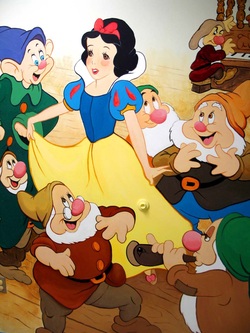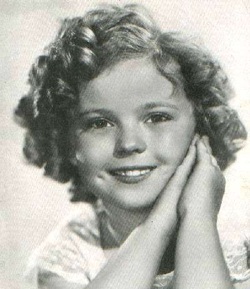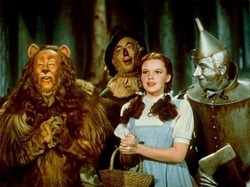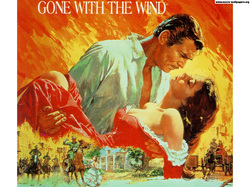Snow White and the Seven Dwarfs

The Great Depression inspired films like The Wizard of Oz, Snow White and the Seven Dwarfs, Gone with the Wind, and films that starred America's little sweetheart Shirley Temple. Snow White and the Seven Dwarfs would be released as the first full-length animated film in 1937. This film told the story of the beautiful Snow White and the envious witch who wanted to be as beautiful as Snow White. In pursuit of this beauty, she gives Snow White a poison apple and the only way to be released from the spell is for her prince to come and give her true love's kiss. This was a fantasy that took people on an adventure and away from their worries.
America's Little Sweetheart Shirley Temple

Shirley Temple would star in many films, most of which were her own. She began acting at age three, and not only was she acting but singing and dancing in such a way that amazed people. These films broadcasted songs like "On the Good Ship Lollipop" and "Curly Top". Shirley Temple had the opportunity to dance with Bill Robinson in many of her films. These movies were exciting and fun and gave people "breathing time". Shirley Temple's songs which were exciting and encouraged people to get up to dance, sing and put the hardships of life behind them.
The Wizard of Oz

In 1939, the popular young lady, Judy Garland, starred in The Wizard of Oz. A famous song would be the outcome of the movie: "Over the Rainbow". This film told the story of a girl named Dorothy and her her dog Toto who escaped life during the Depression to the land of Oz. Along the way, she meets a lion desiring courage, a scarecrow seeking to have a brain, and a tin man who wants a heart. This story would help the people have hope and courage to keep on going, and would capture the hearts of Americans through the years. This movie stunned audiences by being the first movie shot in color.
Gone With the Wind

Another movie that came about in 1939 was Gone with the Wind; a romance story taking place during the Civil War. This film starred Clark Gable as Rhett Butler and Vivien Leigh playing the role of Scarlett O'Hara, who, after confusion and many trials, finds her love for Rhett Butler. It took the Americans' mind off of their own troubles and into another story which motivated them to keep on going even through the pain that awaited them as they walked out of the theater. It still tops many lists as the greatest movie of all time and featured the now legendary quote, "Frankly my dear I don't give a damn". It remains the longest ever movie to win the Oscar for Best Picture being 3 hours 44 minutes long and was the first ever movie to win the Oscar for Best Cinematography.
The Marx Brothers

Groucho Marx, http://afflictor.com/
The Marx Brothers were a family comedy act. There were 5 brothers in total, but only three of them went on to be screen legends. They each had their own stage names. The most well known brother is Groucho (whose actual name was Julius Henry), who had distinctive glasses, a stooped posture, and a painted mustache and eyebrows. He was also well known for his slapstick style.
The eldest of the brothers was Chico, who usually put on an Italian accent and played poor con artists. He was also an accomplished musician and often played in musical acts.
The true musician of the three mainstream Marx Brothers, however, was Harpo, who was mute and mimicked a comedy style similar to that of clowns and pantomimes. He was a fantastic piano player and he also played the harp very well (which is where his stage name came from). He starred in musical acts as well, along with Chico.
The fourth most popular Marx Brother was named Zeppo, who acted with Groucho, Harpo, and Chico until 1933; his last film was Duck Soup which, to this day, is still a very well known comedy film. The first film the Marx Brothers made without Zeppo was A Night at the Opera in 1935, which is perhaps even more well known than Duck Soup. Other famous films of the Marx Brothers are Animal Crackers (1930), Monkey Business (1931), and A Day at the Races (1937), to name just a few.
The following is a clip of Chico and Harpo Marx playing the piano together in The Big Store (June 1941), which was about a detective (Groucho) who was hired to save a department store.
The eldest of the brothers was Chico, who usually put on an Italian accent and played poor con artists. He was also an accomplished musician and often played in musical acts.
The true musician of the three mainstream Marx Brothers, however, was Harpo, who was mute and mimicked a comedy style similar to that of clowns and pantomimes. He was a fantastic piano player and he also played the harp very well (which is where his stage name came from). He starred in musical acts as well, along with Chico.
The fourth most popular Marx Brother was named Zeppo, who acted with Groucho, Harpo, and Chico until 1933; his last film was Duck Soup which, to this day, is still a very well known comedy film. The first film the Marx Brothers made without Zeppo was A Night at the Opera in 1935, which is perhaps even more well known than Duck Soup. Other famous films of the Marx Brothers are Animal Crackers (1930), Monkey Business (1931), and A Day at the Races (1937), to name just a few.
The following is a clip of Chico and Harpo Marx playing the piano together in The Big Store (June 1941), which was about a detective (Groucho) who was hired to save a department store.
